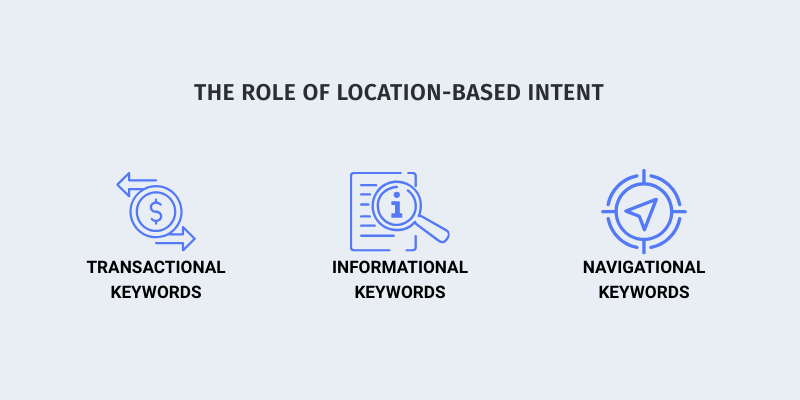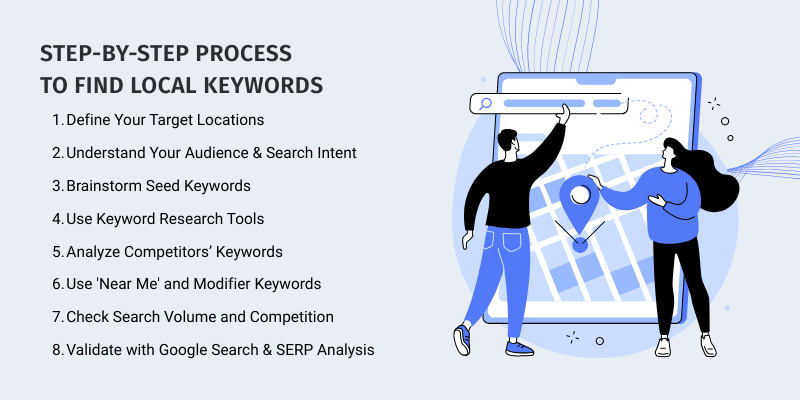Local SEO is all about making sure your business shows up when potential customers search for services or products nearby.
Whether someone is searching for "best pizza in Chicago" or "plumber near me," local SEO ensures your business is visible to those who are actively looking for what you offer in their location.
Finding the right local keywords is one of the most important steps in local SEO.
These keywords help search engines understand that your business is relevant to specific areas and search queries.
Without the right local terms, your business might show up for irrelevant searches, or worse, miss out on the chance to connect with customers nearby.
In this guide, I’ll take you through the process of finding those perfect local keywords.
You’ll start by understanding your target audience and location, and then dive into advanced tools and strategies to build a keyword list that not only boosts your rankings but also drives real traffic and conversions.
Understanding Local SEO Keywords
Local SEO keywords are search terms that include geographic identifiers, such as city names, neighborhoods, or specific locations, that help businesses attract customers within a defined area.
Unlike general SEO keywords, which can be broad and globally targeted, local keywords focus on optimizing your business for users looking for services in their vicinity.
If you want to understand the effectiveness of various keywords, you can explore SEO ranking report tools that can help you track which keywords are improving your visibility.
The Role of Location-Based Intent
Location-based intent plays a vital role in local SEO, as it directly reflects a user's need for a nearby business or service.
For instance, if someone is trying to compare options, advertisement examples showcasing local businesses could be useful. It can be clearly stated, such as in “dentist in Brooklyn,” or implied with phrases like “near me,” which have become increasingly common in recent years.
It can be clearly stated, such as in “dentist in Brooklyn,” or implied with phrases like “near me,” which have become increasingly common in recent years.
As more people use smartphones for location-based searches, it is important that your content aligns with this local search intent.
By doing so, you'll be able to drive foot traffic and generate leads for your business

Location-based search intent can generally be broken down into three main types:
- Transactional keywords: These indicate that the user is ready to make a purchase or take some action. Phrases like “buy coffee beans in Austin” or “affordable car repair in Chicago” are great examples. These keywords are essential for businesses that want to convert local traffic into paying customers.
- Informational keywords: These reflect a user's desire to learn more about a topic. An example might be “how to choose a dentist in Boston.” The goal with these keywords is to educate the user, with the hope of building trust and encouraging future engagement.
- Navigational keywords: These are used when users are searching for a specific place or brand. For example, “Starbucks near Times Square” shows that the user wants to find a nearby Starbucks. These keywords help users locate exact businesses or locations.
By understanding and optimizing for these types of location-based intent, you can make your business more visible to local customers and drive meaningful interactions.
Explore Our Local SEO Services!
Why Finding the Right Local Keywords is Important?
Finding the right local keywords is essential because they directly impact your visibility in search results, particularly in high-visibility spots like the Google Maps 3-pack.
For instance, using "noindex" tags can help you manage unwanted pages in your search results, ensuring that only the most relevant content appears.
This 3-pack showcases the top three local businesses for a given search query, and appearing here greatly boosts your chances of attracting local customers.
Without optimizing for the correct local keywords, you may miss out on this valuable real estate.
Here’s why choosing the right local keywords is so important:
- Higher Visibility: Properly optimized local keywords help your business rank higher, increasing its chances of appearing in the coveted Google Maps 3-pack and local search results.
- Attract Ready-to-Convert Traffic: Targeting keywords with local intent ensures you're reaching users actively searching for your services in their area, often with the intention of making a purchase or booking a service. These users are further down the sales funnel, meaning they’re more likely to convert into paying customers.
- Competitive Edge: Local keywords can give you an advantage over nearby competitors. If your competitors aren't optimizing for local searches, you'll stand out more and capture attention from potential customers in your area.
- Better ROI: Optimizing for the right local terms ensures that your content is relevant to your target audience, which leads to better conversion rates. When your business ranks for the terms your local customers are searching for, you increase both visibility and the likelihood of turning those searchers into loyal clients.
That said, targeting the right local keywords can drive more traffic, boost conversions, and help you outperform local competitors.
Step-by-Step Process to Find Local Keywords
You understand how important local keyword research is, but how do you find the best ones for your business? Luckily, it’s easier than it sounds.
Think of keywords as the foundation of your online presence. Each keyword typically consists of three main elements: a modifier, a core term, and a location.
It may sound a bit tricky, but don’t worry, we’ll guide you through the process of local keyword research, focusing on these key components, to help you enhance your visibility.

1. Define Your Target Locations
The first step in local keyword research is defining your target locations.
Whether you're a single-location business or have multiple branches, understanding where to focus your efforts is essential.
Single Location vs. Multiple Locations
For a single-location business, like a restaurant, focus on that specific area. For example, “Italian restaurant in downtown Austin.”
For multiple locations, develop keywords for each branch, such as “best gym in Midtown Manhattan” or “hair salon in Brooklyn,” ensuring each branch appears in relevant local searches.
Narrow vs. Broad Geographic Targeting
Decide whether you’ll target a broad area (e.g., “restaurants in San Francisco”) or narrow your focus to specific neighborhoods or landmarks (e.g., “vegan restaurant in Mission District”).
Narrowing your focus increases relevancy, competitiveness, and the chances of ranking higher in local searches.
Additionally, understanding what is the digital marketing strategy that tracks users across the web can help tailor your local strategy for better reach.
Mapping Service Areas for Service-Based Businesses
If you operate in a service-based industry, such as plumbing or cleaning, and don’t have a storefront, focus on defining your service areas.
Target specific neighborhoods or zip codes with keywords like “emergency plumbing in 94109” or “electrician in North Beach” to ensure you show up in local searches relevant to your service areas
By defining your target locations and focusing on specific areas, you can improve your local SEO and connect with the right customers.
2. Understand Your Audience and Their Search Intent
Once you've defined your target locations, the next step is understanding the search intent of your audience.
Local searches can vary greatly in intent, so it’s crucial to know what users are looking for to target the right keywords.
For example, "how to search for words on a page" can help users navigate through your site more effectively and find the services they need.
Transactional Intent
These keywords show that users are ready to make a purchase or take action. Examples include “buy pizza in downtown Chicago” or “book a massage in Portland.”
Users with transactional intent are usually further down the sales funnel and more likely to convert into paying customers.
Informational Intent
These searches are made by users seeking information or answers. For example, “how to find a dentist in San Diego” or “top restaurants in Chicago.”
While these searches may not directly lead to a sale, they guide users to your website, where you can nurture them into future customers.
Navigational Intent
These searches are when users are looking for a specific business or location, like “Starbucks near me” or “best sushi restaurant in Seattle.”
They have high local intent and are valuable for businesses with recognizable brands or those near popular landmarks.
Local Modifiers
Don’t overlook the importance of local modifiers such as “near me,” “in [city],” “around [neighborhood],” and “close by.”
These terms are often used in mobile searches and are essential for capturing high-intent local traffic.
Understanding the search intent behind local keywords will help you target the right audience and optimize your local SEO strategy.
3. Brainstorm Seed Keywords
Before using keyword research tools, it's helpful to brainstorm potential seed keywords.
These are the foundational keywords that will kickstart your research.
Include Your Services and Products
Start by listing the core services or products your business offers. For example, if you run a bakery, seed keywords might include terms like “fresh bread,” “cakes,” or “pastries.”
Combine these with your location to create initial keyword ideas, like “best bakery in San Francisco” or “fresh bread in Brooklyn.”
Include Synonyms and Variations
Consider the different ways people may search for your products or services.
Think of synonyms, slang, or regional variations that could be used, as these can reveal additional keyword opportunities.
For instance, if you offer organic SEO services, think about alternative terms like “natural SEO” or “ethical SEO” that might resonate with your target audience.
Customer Input
Get feedback from your existing customers to understand how they search for your business. Conduct surveys, customer interviews, or social media polls to gather insights.
Customers might use terms or locations you hadn't thought of, helping you refine your keyword strategy.
These brainstorming steps will give you a strong starting point before diving deeper into keyword research.
4. Use Keyword Research Tools
Now it's time to refine your list of potential local keywords using keyword research tools.
These tools help you discover search volume, competition levels, and related keywords that you may have overlooked.
For example, you may wonder if "is affiliate marketing legit?" when trying to determine how to generate income via affiliate links. Tools like Google Keyword Planner or SEMrush will help answer these questions.
Here are some tools to consider:
Google Keyword Planner
A free tool that helps you find keyword ideas based on your products or services. It provides valuable data like search volume, competition, and suggested keywords.
You can also filter results by location, which is ideal for targeting specific cities or regions.
Google Autocomplete
This tool suggests search queries based on what people are typing into Google.
Start typing your seed keywords, and you’ll see location-based suggestions, such as “affordable plumbers in [your city].” This can give you insights into what users are actually searching for.
SEMrush, Ahrefs, and Moz
These premium tools offer advanced features for keyword research.
They provide detailed data on search volume, competition, and even show which keywords your competitors are ranking for.
These tools allow you to dig deeper and find the most effective local keywords for your business.
Using these tools will help you optimize your keyword strategy and target the right local audience effectively.
5. Analyze Competitors’ Keywords
To find even more local keyword opportunities, research what your competitors are targeting. Analyze local competitors who rank highly for relevant searches. You can use tools like Ahrefs or SEMrush to see what keywords they’re ranking for and identify gaps in their strategies that you can exploit.
If you’ve been wondering "Duckduckgo vs Google," it’s important to understand which search engine might provide better visibility for your local keywords based on the target audience’s search preferences.
Look for areas where competitors are underperforming or not targeting specific locations or search terms that are relevant to your business. By filling these gaps, you can gain a competitive edge in your local market.
6. Use 'Near Me' and Modifier Keywords
Keywords like “near me,” “open now,” or “top-rated” have become extremely popular in local searches, especially on mobile devices.
Including these modifiers can help you capture people who are looking for businesses or services in their immediate area.
For instance, terms like “SEO services near me” can effectively target local customers seeking specific services nearby.
Incorporating these modifiers into your keyword strategy is crucial for appearing in mobile searches and voice queries, where people often use conversational language.
7. Check Search Volume and Competition
Now that you have a list of potential local keywords, it’s time to evaluate them. Look at the search volume (how often the keyword is searched) and competition (how many businesses are targeting that keyword).
Ideally, you want to find keywords with moderate to high search volume and low competition. This is where long-tail keywords often shine because they have lower competition but can still be highly relevant.
If you're offering digital transformation services, be sure to assess both the search volume and competition in your market to find the best opportunities.
Using tools like Google Keyword Planner, SEMrush, or Ahrefs will allow you to evaluate and prioritize your keywords based on these metrics.
8. Validate with Google Search & SERP Analysis
Finally, perform your own search engine results page (SERP) analysis. Enter your keywords into Google and look at the results.
Are the websites ranking for these terms relevant to your business? What types of pages are showing up (e.g., Google Maps, organic listings, ads)?
For example, if you are offering digital marketing services, check if the top-ranking sites are related to your specific offerings or if you need to adjust your keyword strategy.
By analyzing the results, you can assess the viability of your keywords and identify areas where you can improve your content or website.
Creating a Local Keyword List
Once you have gathered a list of local keywords, it’s essential to organize them in a way that ensures maximum effectiveness.
A well-structured keyword list will help you optimize your content, improve SEO rankings, and avoid keyword overlap that can harm your site’s performance.
1. Organizing Keywords by Location and Intent
Start by categorizing your keywords based on their geographic targeting and user intent. For example, keywords like “best plumber in Dallas” or “emergency electrician near me” target specific locations and transactional intent.
If you're offering SEO services or are positioning yourself as the best digital marketing agency, keywords like “SEO services in Austin” or “best digital marketing agency in NYC” would be essential to focus on.
Group keywords related to broad areas, such as “plumber in Texas,” and more specific ones, like “24-hour plumber in downtown Dallas,” to ensure a focused approach.
This organization helps you target local searchers with varying levels of intent, from those seeking immediate services to those simply exploring options.
2. Grouping for Different Landing Pages and Service Page
Next, assign your organized keywords to relevant landing pages or service pages.
This targeted grouping ensures that each page ranks for the most relevant local terms, which can enhance the page’s SEO performance.
3. Avoiding Keyword Cannibalization
Keyword cannibalization occurs when multiple pages on your website target the same keyword, leading to competition between those pages for rankings. To avoid this, ensure that each page is optimized for unique keywords.
By keeping your keyword targeting distinct and clear, you’ll avoid confusion for search engines and boost your chances of ranking for all of your keywords effectively.
Frequently Asked Questions
What is local SEO keyword research and why is it important?
Local SEO keyword research is the process of finding the search terms people use when looking for products or services in a specific city or area. It helps businesses show up when local customers search for services “near me” or “in <city>,” improving local visibility and attracting relevant customers.
How do I start finding keywords for local SEO?
Begin by listing your core services — these are your “seed keywords” (e.g. “plumber,” “coffee shop,” “graphic designer”). Then combine them with location modifiers like city names or neighborhood names to reflect how people actually search (e.g. “plumber in Karachi,” “coffee shop near Clifton”).
What tools can help me discover local SEO keywords in 2026?
You can use both free and paid keyword‑research tools such as Google Keyword Planner, Soovle, and other keyword‑generator tools to identify search volume, local modifiers, and related search phrases.
How should I validate and prioritise local keywords before using them?
You should check each keyword’s search volume, competition, and search intent — choosing ones that show enough demand and match what your business offers. Focus on keywords with moderate competition and clear local intent to improve your chances of ranking.
Should I target long‑tail or short‑tail keywords for local SEO?
Long‑tail keywords with modifiers (e.g. “best bakery in Karachi,” “24/7 plumber near me”) tend to be less competitive and more specific, which increases the chance of ranking and attracting ready‑to‑buy local customers. Short‑tail keywords are broader but often too competitive for small or local businesses
Conclusion
Targeted local keywords are essential for improving your local SEO and ensuring that your business appears in the right search results for your geographic area.
By using location-based and intent-driven keywords, you can attract high-quality, ready-to-convert traffic, giving your business a competitive edge in local markets.
However, keyword research is not a one-time task. As search trends and customer behaviors evolve, it’s important to regularly revisit and update your keyword strategy.
Consistent optimization and monitoring of your local SEO efforts will help maintain and improve your rankings over time.
By staying proactive with your local keyword strategy, you can continue to drive relevant traffic, improve visibility in local searches, and ensure long-term success for your business in a competitive online environment.









